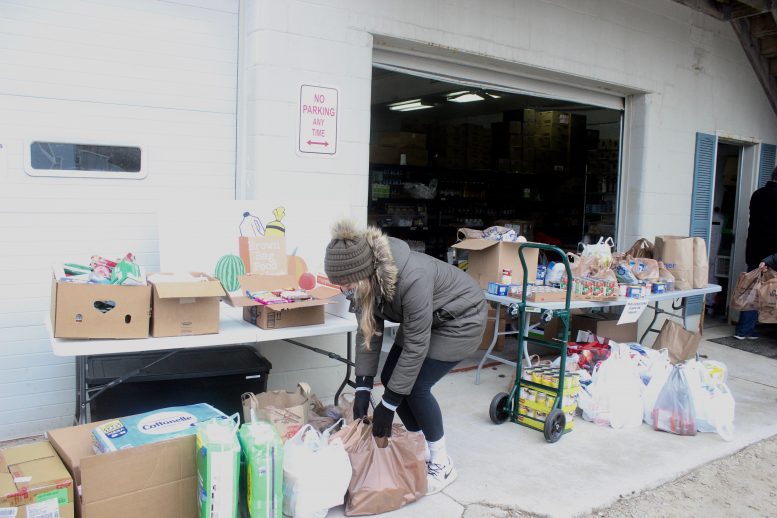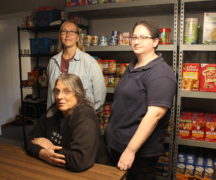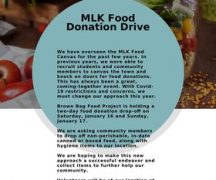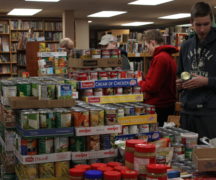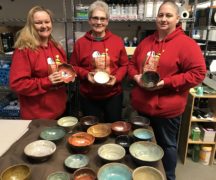By DAVID DUPONT
BG Independent News
On Saturday morning, shortly before the Martin Luther King Jr. Day food drive was supposed to start, the shelves at the Brown Bag Food Project were looking kind of bare.
On Sunday as the drive in food collection was ending, volunteers were struggling to find room for all the food and other items collected.
Amy Jeffers, assistant director of Brown Bag, said going into it they weren’t sure how the drive would go.
In past years the project has coordinated a food drive that sent volunteers to go door to door in neighborhoods around the city to collect food. With the pandemic, that wasn’t possible, so they asked people to bring their donations to the Brown Bag’s office on Sand Ridge Road.
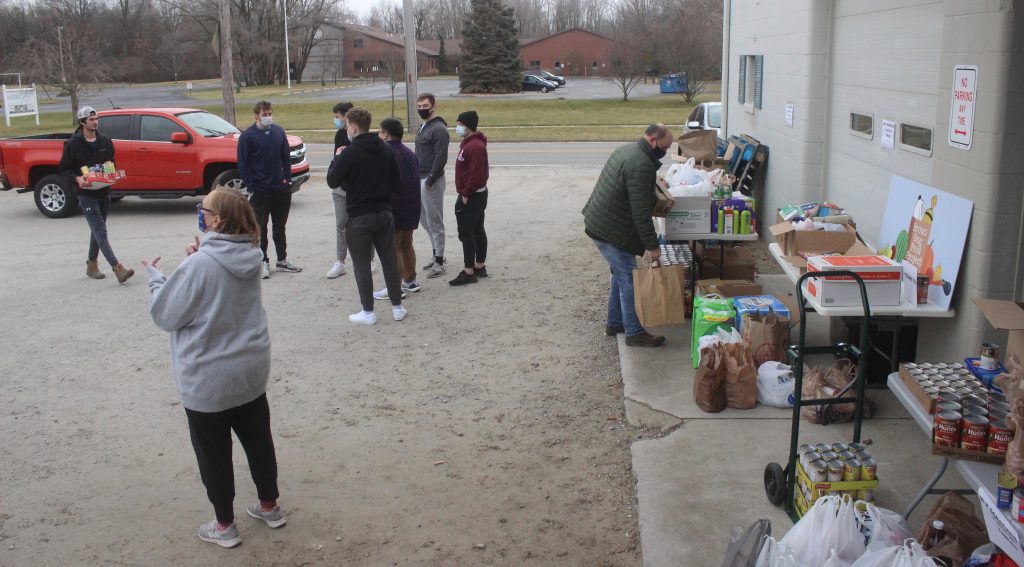
The outpouring exceeded Jeffers’ expectations. “I had no idea it would be this huge,” she said Sunday just after the collection was completed. “Yesterday we were overwhelmed thinking this is amazing. My thought was Sunday will be slower. We might get a few people who’ll trickle in. We’ll get some stuff organized. No, we literally got almost the same amount as we got yesterday . It’s been mind-blowing.”
BGSU Professor Shannon Orr, who was volunteering, estimated they had collected well over 1,000 bags of food. But the flow of deliveries outpaced volunteers’ efforts to keep track.
Now volunteers were busy moving food from the tables set up outside where snow was starting to fall into the now packed interior of the office.
Sorting will have to wait.
Jeffers said the drive brought in more food than the previous MLK Day of Service efforts.
She gave credit to V. Rosser, director of the Center for Community and Civic Engagement at Bowling Green State University. In the past she helped recruit volunteers.
This year she issued a challenge to departments on campus to each deliver 21 items, for 2021, to Brown Bag. She hoped to get 20 departments involved.
That had a nice ring, 20 and 21, but it didn’t work out that way.
At last count, Jeffers said, more than 80 campus entities were involved. “any department you can name” was engaged, and the competitive spirit kicked in. They were all delivering more than the 21 items.
The athletic department got teams involved. Fraternities and sororities collected as did some residence halls.
And, Jeffers said, “community turnout was through the roof.”
The donors said they’d seen media coverage and posts on social media. “What’s been really cool is a lot of the people who turned out in the community weren’t necessarily people who donated before to us,” she said. They asked about whether Brown Bag was planning another drive and asked what kind of items the food project needed.
“We’re going to feel the positive effect of this on down the road. It’s just so amazing.”
Brown Bag took over organization of the MLK Day food drive several years ago. The event started in the wake of election of President Barack Obama, when those who supported him wanted to sustain the energy of the campaign through community service.
The Brown Bag Food Project provides emergency food assistance for those not qualified for other help. It also provides hygiene items, diapers, and pet food.
The outpouring of support this year is needed, Jeffers said. “Our numbers have pretty much skyrocketed.”
Many nights when the office opens at 5 p.m. people are lined up down the street waiting for help.
In the last the proceeds from the MLK drive were divvied up among other local food pantries. That wasn’t the case this year.
“That’ll be something as a board we’ll talk about,” Jeffers said.
Jeffers said they were uncertain what the response would be, and in the past other pantries were asked to provide help with the drive.
Brown Bag volunteers handled the effort this year. The drive also got assistance from students from Orr’s class as well as a trio of cheerleaders who asked if they could help.
The success of the drive-in food collection will permanently change how it is conducted.
While having people go door-to-door has a nice community feel to it, the results of what’s collected are “like night and day,” she said.
The canvassing results in far more out-of-date items being delivered, which cannot be used.
This year people were going out and buying products, dropping off flats of merchandise.
Fewer than 100 out-of-date items were found.
“This is so much better.”

